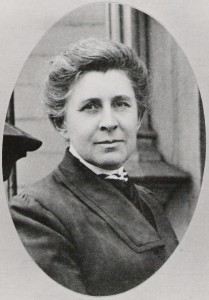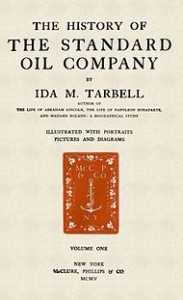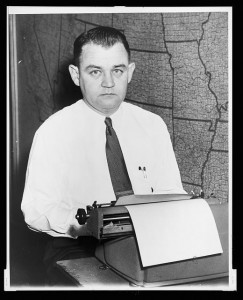Bill Wolman
By Jonathan LaMantia
Remembered by his colleagues as a messy but brilliant man, William “Bill” Wolman accomplished much during his 40-year career in business journalism, thriving as a BusinessWeek editor and CNBC commentator — two paths which at first seemed odd fits for a man who held a doctorate in economics.
Wolman made it work though, balancing the roles of economist, reporter and editor at BusinessWeek, and later, adding the role of commentator on CNBC.
Soma Golden Behr joined BusinessWeek’s staff two years after Wolman in 1962 when one of her professors told her it was the only place where a journalist could write about economics. She said she remembered Wolman as a wonderful character.
He would roll up his sleeves, even in the middle of winter, she said, and there would be cigarette ashes falling down his shirt.
“I remember when he cooked a goose at Christmas. It was such a big job and there was so little meat in the goose. It was very funny. He was quirky,” Golden Behr said. “He was just kind of the crazy professor-type in the middle of a very businessy place. But he was so smart and he had such insights on everything that he got away with it.”
Raised in Montreal, Canada, Wolman graduated from McGill University and earned his doctorate in economics from Stanford University.
In 1960, while working as an assistant professor of economics at Washington State University, Wolman took a $500 flight to New York to interview at Business Week.
He was hired by Leonard Silk, whom Wolman described to colleagues as a mentor, and later became the economics editor in 1965.
Golden Behr described Wolman, who died on Dec. 5, 2011 at the age of 83, as always interested in exploring economic ideas and relating them to people’s lives.
“He wasn’t interested in just abstract theory. It was about how it affected policy or the way the economy was or the way people lived,” she said. “He wrote in the English language. He didn’t just write numbers. He wasn’t going to be happy writing for economic journals. He was writing for laymen, and businessmen and policymakers.”
Though Silk left the magazine in 1969, Wolman remained for much of the next 30 years, until he retired as chief economist in 2001.
He left and returned to BusinessWeek twice during his career, holding positions at Citibank and Argus Research, an investment research company, while he was away from the magazine.
Steve Shepard, who served as editor-in-chief of BusinessWeek from 1984 to 2005, said Wolman liked to play in late-night poker games at retreats, which the BusinessWeek editorial staff held to discuss ways to improve the magazine, “For an intellectual, which he really was, he was also one of the guys — bawdy and loved to play poker and smoke cigarettes and stay up all night,” Shepard said.
Wolman won a National Magazine Award for his 1980 single-topic issue, the “Reindustrialization of America,” which explored whether the United States could regain its manufacturing prowess. The issue also received a Deadline Club award, a John Hancock Award and a University of Missouri Journalism Award.
Michael Mandel, who joined the BusinessWeek staff in 1989 and took over as chief economist at BusinessWeek when Wolman retired, said the issue exemplified Wolman’s support of big ideas.
“In retrospect, in some sense, it was too early,” Mandel said. “But it really sort of showed Bill’s ability to get a hold of important issues when they were very early because at that point, there was still debate about what was happening to manufacturing.”
Mandel said Wolman’s expertise in economics helped him use data to reveal the implications of economics stories.
“He knew where all the bodies were buried because he knew economics,” Mandel said. “He was able to cut through a lot of the fog and really get at what people cared about.”
A coworker of Wolman’s for 18 years, Gary Weiss said Wolman’s greatest contribution to the magazine was as a staunch advocate for writers in the finance and economics departments, which he supervised from 1986 to 2001.
“He wasn’t afraid to really push for his people, despite the institutional bias against tough articles at the magazine,” said Weiss, who dedicated his most recent book to Wolman and fellow BusinessWeek editor Seymour Zucker. “By tough articles I mean investigative articles that reflected negatively on people on Wall Street.”
Weiss recalled a meeting where Shepard wanted to downplay the negative aspects of an article he was writing on the American Stock Exchange Emerging Company Marketplace. After leaving the meeting, Wolman and editor Chris Welles told Weiss to disregard those instructions and proceed as intended. The article came out the way Weiss wanted it.
“Not every editor would do that, saying, ‘Just disregard everything the editor-in-chief says,’ Weiss said. “That was pretty rare.”
Wolman also co-authored four books: “The Beat-Inflation Strategy” in 1975; “The Decline of U.S. Power” in 1980; “The Judas Economy” in 1998; and “The Great 401(k) Hoax” in 2003. He co-authored the latter two works with his wife, Anne Colamosca.
His contributions to business journalism were not limited to print, though.
In the early 1980s, Wolman served as the executive editor of “Business Times,” a business news program on ESPN that predated CNBC.
He would later appear as a commentator on the CNBC programs “Market Wrap” and “Closing Bell,” in which he was positioned as the left-leaning economist opposite conservative commentators like Larry Kudlow.
Tyler Mathisen, who co-anchored “Market Wrap” and “Closing Bell,” said he thought Wolman, with his tousled white hair and slightly raspy voice, made a curious choice as a TV commentator.
“He was unapologetically un-TV,” Mathisen said. “If Brian Williams and Scott Pelley are in your minds-eye when you think of a TV journalist, Bill Wolman was about as far from that as you can get.”
But Mathisen remembered Wolman for his preparedness and ability to explain economic concepts in a logical way.
“He understood who his audience was, and he understood that though he understood the content, maybe the viewer didn’t,” Mathisen said. “The best communicators and the really masterful people can make it really simple and digestible for the everyman, and he was able to do that.”
During the time he juggled both BusinessWeek and CNBC, Wolman would leave the magazine’s offices to appear on CNBC, returning sometimes in the evening to edit stories.
“He’d disappear around 3:30, 4 o’clock,” said Jeff Laderman, who worked with Wolman at BusinessWeek for 15 years. “We had a TV going in the pantry, and you’d walk into the pantry and see him there.”
Though BusinessWeek changed after Wolman left, Shepard said the pioneer of economics reporting’s lasting impact on business journalism could be seen in the numerous journalists he hired and trained.
“There were a lot of people who came along, and he identified those people and hired them and trained them. He was really very good at that,” Shepard said. “He cared about hiring very smart people that would be in his mold.”
Jonathan LaMantia is a Class of 2014 business journalism major at the University of North Carolina at Chapel Hill from Oceanside, N.Y.


